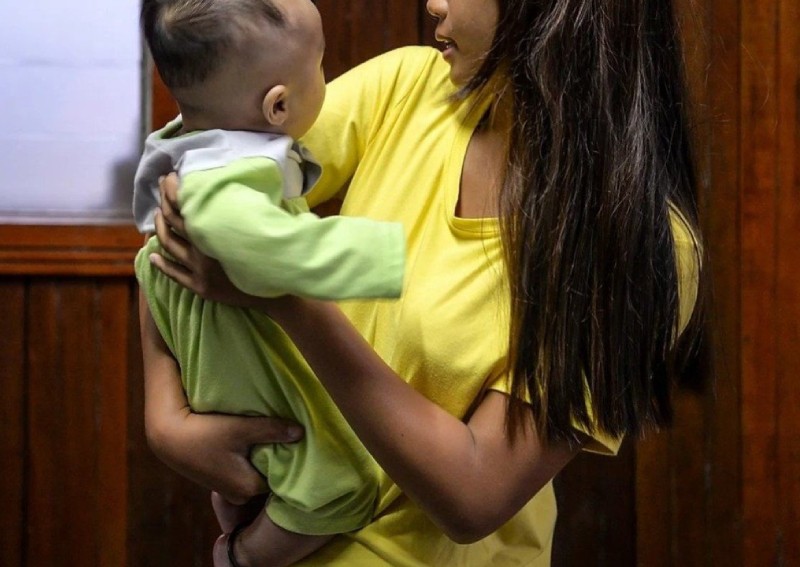In Malaysia, calls grow for child marriages to end by reforming laws

Seven years ago, Lia (not her real name) was just months away from sitting for the national examination to get her high school certificate when she found out she was pregnant. The 17-year-old dropped out of school but still sat her final exams, scoring an A for English and Cs and Ds for other subjects. It was enough for her to qualify for pre-university education but she decided instead to marry her then-boyfriend, who was 32.
Lia, now 24, said her mother, who had raised her as a single parent after getting divorced, supported her decision.
“My mother agreed as she thought getting married would help ‘tame’ me,” said Lia, referring to how, as a teenager, she would go out late at night and rebel against her mother’s instructions.
It was legal for Lia to marry because Muslims in Malaysia, who are subject to sharia or Islamic law under the country’s dual-legal system, only need to be 16. Under secular law that applies to non-Muslims, who make up 28.7 per cent of the 32.7 million population, both parties have to be at least 18 to get hitched.
Looking back, Lia says she regrets her decision even though she enjoys parenting her son, who is now seven.
She suffered from post-partum depression and exhaustion in the early years of her marriage. Her husband had worked odd jobs before they married but he refused to continue doing so, so seven months after giving birth, she was forced to get a job in a pet shop as a sales assistant. She earned RM900 (S$215) a month.
“I am just lucky that my own father had cared for the baby [when he was born]. He paid hospital bills and provided the necessary care for the baby,” Lia said.
“I wish that I had the opportunity to be a teenager because when everyone was busy growing up, I was at home being a wife and mother but I have nobody else to blame but me. It was such a bad experience and I am glad I have the chance to share my story as a lesson.”
She filed for divorce 18 months after her wedding and believes there is a need for Malaysia to change its laws so that teens younger than 18 are not allowed to marry.
“Kids are kids and to expect a 16-year-old to be mature enough to be married is wrong. Why do we expect and prepare girls to be mature enough like they are some kind of fruit waiting to be picked?” she said.
Malaysia’s acceptance of child marriage – defined by the United Nations as a formal union between two people where one is under the age of 18 – is not unique in Asia. South Asia currently has the highest rate of child marriage in the world where 45 per cent of all women aged between 20 and 24 were reported being married before the age of 18, and almost one in five girls are married before the age of 15. Child marriages are also an issue in Indonesia, where the government has committed to reducing its prevalence.
Last December however, Malaysia’s religious affairs minister rejected a proposal by his colleagues from the Women, Community and Development Ministry to raise the minimum marriage to 18.
The religious affairs minister, a senior cabinet member who is part of the Prime Minister’s Office, said feedback from several of Malaysia’s 13 states and three federal territories showed that they wanted to keep the minimum marriage age of 16 for Muslims. As issues involving Muslim marriages fell under the jurisdiction of state governments, the federal government had to respect their wishes.
Currently, Selangor – the commercial heartland of peninsula Malaysia – is the only state that has changed the legal marriage age for Muslims to 18. At least five other states and three federal territories, including the business capital of Kuala Lumpur and the seat of government Putrajaya, have agreed to amend their Islamic family laws. But states that are known to be more conservative, such as Perlis, Negeri Sembilan, Kedah and Kelantan, have yet to agree to raise the legal marriage age to 18.
Child marriages are also a long-standing issue in Sabah and Sarawak, not just among Muslims but within the indigenous communities of the state’s numerous sub-ethnic groups, who are subject to their own “adat” or customary law.
Between January and September 2020, Malaysia recorded 543 child marriages, including applications for such unions to take place. Sarawak registered the highest figures according to the Women, Family and Community Development Ministry.
Data from the United Nations Children’s Fund (Unicef) from 2018 showed Sabah had the highest number of Muslim child marriages that year, with 334 recorded unions.
Experts say the number of child marriages globally has surged as poverty fuelled by the pandemic has led families to marry off their daughters to reduce financial pressures.
Lee Lyn Ni, a Child Protection Specialist at Unicef Malaysia said the organisation was working in consultation with the federal government to raise “awareness about the risk and threats posed by the practice” of child marriage.
Lee said legal reform was key and one way forward was to set the legal age for marriage at 18 without exceptions. This would be in line with Malaysia’s commitments under existing human rights conventions to protect children, such as the Convention of Rights of the Child (CRC), ratified by Malaysia in 1995 and the Convention of Elimination of All Forms of Discrimination Against Women (CEDAW), that the country ratified in August 1995.
Government agencies could also research the possibility of criminalising child marriage, she said. Lee added that changing attitudes and behaviours was also key as child marriage was deeply rooted in social and economic circumstances.
“Unless there is a change in societal values, opponents of child marriage will always fear physical or social retribution,” she added.
Given the complexity of the issue, efforts to end child marriages would require different government departments – from education to health to social welfare – to work together. For example, pregnancy out of wedlock was a factor driving child marriages. While reproductive health education was in the school syllabus, a lack of trained teachers and a lack of support from parents meant practices such as safe sex were not widely discussed or implemented.
In a co-authored Unicef report on ending child marriage, Lee noted that there was “minimal discussion on pregnancy prevention or termination of pregnancies, even where permissible under the law due to moral and religious values which often deem options as unacceptable and immoral”.
Given that poverty was also a factor, providing an appropriate level of income security for all Malaysians could also address the issue of child marriages.
“Adequate benefits for children and families across poor and lower-income households can ensure children from the lower income families do not exit the education system prematurely,” she said.












Comment (1)
Hi, Can I just say what a relief to find someone who actually knows what theyre talking about on the internet. You definitely know how to bring an issue to light and make it important. More people need to read this and understand this side of the story. I cant believe youre not more popular because you definitely have the gift.